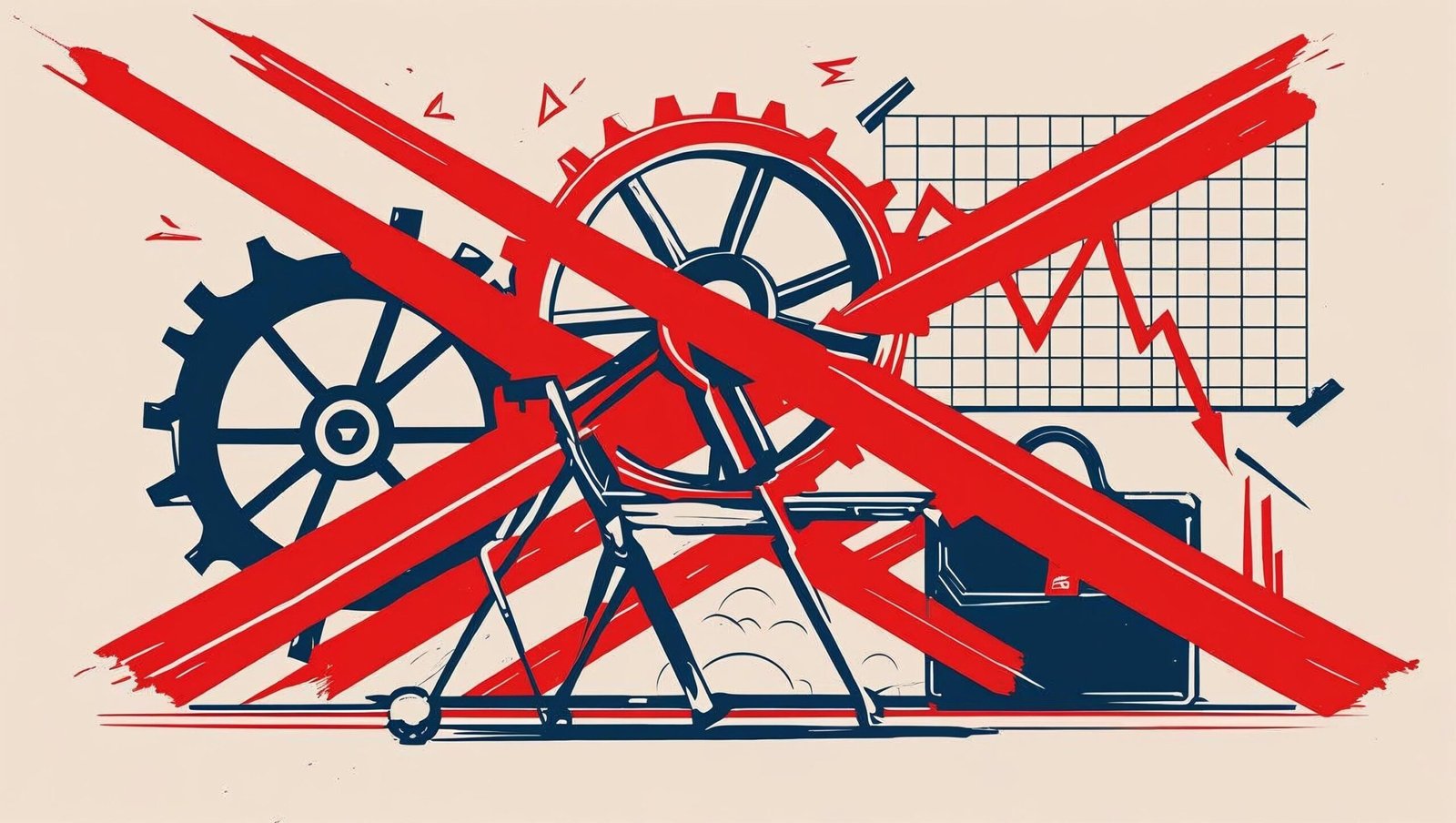11 Unconventional Lessons from Rework by Jason Fried & David Heinemeier Hansson
In the saturated world of business books, Rework stands apart—not merely as a book but as a manifesto. Authored by Jason Fried and David Heinemeier Hansson, the founders of Basecamp, this book is a fierce rebuttal to traditional entrepreneurial doctrines. In this detailed Rework book review, we explore why it has captivated entrepreneurs, freelancers, and dreamers across the globe.
Whether you are a seasoned business owner or someone striving to escape the 9-to-5 grind, this Rework book review will reshape how you view productivity, planning, and even work culture itself.
Introduction: Breaking the Mold
Rework is not your traditional business guide. Unlike tomes filled with MBA jargon and five-year planning templates, Rework is a collection of sharp, brief insights that challenge age-old assumptions about entrepreneurship. In this Rework book review, we will examine key takeaways that redefine how to launch, run, and grow a business in the digital era.

1. Planning Is Guessing
One of the earliest arguments in Rework is against over-planning. Fried and Hansson boldly state that long-term business planning is essentially guessing. This Rework book review agrees—it is better to take calculated actions today than wait for a perfect tomorrow.
2. Workaholism Is a Weakness
Far from celebrating hustle culture, Rework brands workaholism as inefficient and unsustainable. True productivity stems from focused, high-quality work—not from burnout. This insight in the Rework book review directly contrasts with the glorification of overwork in mainstream narratives.
3. Embrace Constraints
Instead of viewing limitations as obstacles, Fried and Hansson urge us to use constraints as creativity boosters. According to this Rework book review, fewer resources mean smarter decisions and innovative outcomes.
4. Meetings Are Toxic
Yes, you read that right. Meetings are portrayed as productivity killers. In this Rework book review, we find that the authors advocate for clear, written communication instead. If something can be resolved in a quick message, why waste an hour in a room?
5. Don’t Be a Hero
Contrary to the romantic idea of entrepreneurial heroes who fix every issue, Rework advises against this solo mindset. This Rework book review highlights how sustainable businesses rely on systems, not on superhuman effort.
6. Launch Now, Refine Later
Waiting for perfection is a trap. Fried and Hansson push for launching early and improving iteratively. This Rework book review applauds this lean startup approach—ship fast, learn faster.
7. Ignore the Real World
“The real world” is often used to discourage novel ideas. In this Rework book review, we see how the authors criticize this phrase as a weapon of fear. Innovation requires imagination, not resignation.
8. Make a Stand
Neutrality is bland. Businesses must have a personality, a perspective. According to this Rework book review, audiences connect deeply with brands that stand for something—even if it alienates a few.
9. Say No by Default
Too many commitments dilute a business’s core strength. Fried and Hansson encourage readers to say ‘no’ more often to preserve focus. This Rework book review concurs: focused execution beats scattered action.
10. Build an Audience
Forget expensive ads. In today’s digital age, content marketing and building genuine connections matter more. This Rework book review praises the emphasis on writing, sharing knowledge, and offering value.
11. Be a Starter, Not an Entrepreneur
The term “entrepreneur” is laden with baggage and ego. Fried and Hansson prefer “starter”—a simpler term. This Rework book review supports this mindset shift, which lowers the psychological barrier to launching something new.

Exploring the Philosophy Behind the Pages
One of the most compelling aspects of this book lies not just in its practical advice but in the underlying philosophy that challenges the dominant corporate culture. The authors are not merely offering advice on what to do; they are provoking a fundamental reassessment of why we do things a certain way.
Their perspective emerges from lived experience rather than academic theory. Unlike many authors who write from the safety of tenure or consultancy, the writers are practitioners. Their ideas are rooted in the trenches of digital business, product development, and remote team management. The tone of their message is urgent, candid, and refreshingly devoid of pretension.
What they offer is not an escape from work but a confrontation with its meaning. Why do people stay busy for appearances? Why do businesses grow for the sake of ego rather than necessity? Why is delay often mistaken for strategy? These are not rhetorical questions in their framework—they are calls to rethink.
Remote Work and Autonomy
A notable dimension of the authors’ worldview is their unapologetic support for remote work. Long before the global pandemic normalized virtual collaboration, they had been running their entire operation remotely. Their approach demonstrated that physical presence does not guarantee productivity, nor does it build culture by default.
Instead, they advocate for asynchronous communication, allowing team members to operate at their most productive times. The results speak for themselves: fewer distractions, greater flexibility, and more trust. This practice, which seemed radical a decade ago, is now being widely adopted by companies across sectors.
The underlying idea is autonomy. When professionals are trusted to manage their time and deliver results, they often exceed expectations. What the authors reject is the managerial impulse to micromanage through proximity and pressure.
Culture Is the Byproduct of Consistency
Another powerful insight from the text is the notion that culture is not created through slogans, posters, or corporate retreats. Rather, it is a byproduct of consistent behaviour over time. When leaders respect time, promote clarity, and act with integrity, those values become embedded in the organisation.
Culture is therefore not a brand exercise—it is an operational one. It is built quietly, in the margins of emails, meetings (or their absence), and policies. The company behind this philosophy has a culture rooted in clarity and simplicity because its founders practice what they preach.
Small is Not a Limitation—It is an Advantage
Traditional wisdom often equates scale with success. Bigger teams, bigger offices, and bigger budgets are assumed to be hallmarks of achievement. The writers flip this idea on its head. They argue that being small is not a transitional phase but a strategic advantage.
Small teams communicate more effectively, adapt quickly, and avoid the bureaucratic sludge that slows down large corporations. They can experiment, pivot, and recover without having to wade through layers of approval.
This view dismantles the myth that growth is the ultimate goal. Sometimes, maintaining a manageable scale ensures better quality, stronger focus, and a healthier team. Scaling prematurely can dilute purpose and increase operational chaos.
Real Artists Ship
Borrowed from Steve Jobs, this famous phrase finds strong resonance in the pages of the book. The authors argue that ideas are useless without execution. Too often, people hide behind ideation, perfectionism, or over-analysis. What matters is delivery—shipping a product, releasing a feature, or launching a service.
They encourage creators and builders to expose their work to the world, even if it’s not flawless. Feedback, iteration, and evolution cannot begin until something tangible exists. This notion helps overcome the paralysis that comes with perfection-seeking.
By treating creation as a cycle rather than a climax, the book urges readers to stop waiting for the ideal moment. The perfect time rarely arrives. Action beats aspiration.

Learning from Successes, Not Just Failures
Contrary to the business world’s obsession with failure as a teacher, the authors argue that success also carries valuable lessons. While it is true that failure teaches resilience, success reveals what works. If something thrives, dissect it. Understand the levers that contributed to its rise.
In a landscape that often glorifies failure as a rite of passage, this angle offers a balanced view. It suggests that both outcomes—success and failure—carry insights, but we should not idolize one at the expense of the other.
Moreover, they caution against the over-analysis of failure. Sometimes things don’t work out not because of flawed strategy, but because of bad timing, luck, or external disruptions. Dwelling excessively on loss can be just as misleading as blindly celebrating a win.
Ownership Over Entitlement
One subtle but strong message woven through the book is the importance of ownership—taking responsibility for outcomes, for decisions, and for one’s career. In an age where entitlement is sometimes disguised as ambition, the authors remind us that real change begins with accountability.
Whether one is running a business, leading a team, or working independently, the ability to own one’s work makes the difference between mediocrity and excellence. It is not about blame, but about ownership in the purest sense—knowing that your choices shape your direction.
This mindset encourages initiative. Instead of waiting for instructions, professionals are nudged to take the first step, to solve problems creatively, and to view challenges as opportunities for growth.
The Power of Saying ‘No’
Modern businesses often suffer from overextension. In the race to please every customer, capture every opportunity, and add every feature, they lose sight of their core offering. The authors advocate for restraint.
Saying “no” is not negative—it is strategic. Every “yes” to a new idea is a “no” to focus. By setting boundaries, companies retain their identity and deliver more value to the right customers. Feature creep, scope drift, and misaligned expansions are often symptoms of weak filters.
By mastering the art of refusal, businesses can preserve clarity, avoid fatigue, and protect their most important assets—time, energy, and attention.
Embracing the Power of Writing
Among the lesser-discussed but immensely valuable lessons from the book is the role of writing in business. Clear writing, the authors argue, is a reflection of clear thinking. In a world increasingly dominated by video calls, chats, and presentations, good writing remains an underrated skill.
Whether it is crafting a product description, writing an internal memo, or responding to a customer query—clarity of thought makes all the difference. Writing allows ideas to be revisited, refined, and distributed without dilution.
The emphasis on writing also reflects their belief in asynchronous work. A written update allows recipients to read, reflect, and respond on their own schedule, thereby reducing interruptions and enhancing depth.
Legacy Over Hype
The modern startup world is intoxicated by hype—funding rounds, user acquisition charts, and social media buzz. Against this backdrop, the authors suggest something radical: build for the long haul.
Instead of chasing the next big thing, they advocate for creating something valuable, sustainable, and profitable. This perspective brings calm to the frenzy of entrepreneurial life. It reminds builders that longevity often matters more than speed.
What matters is not how loudly you announce your arrival but how deeply you serve your customers. Legacy is built quietly—through consistency, trust, and substance.

Human Over Machine
Perhaps the most touching insight from the book is that businesses are run by people, for people. Behind every interface is a human being—often overlooked in the rush for efficiency. While automation and scale have their place, the essence of work remains deeply human.
The authors remind us to inject personality, empathy, and care into our interactions. Whether it’s writing an error message, designing an onboarding process, or resolving a complaint—humanity must not be sacrificed.
In a world obsessed with optimisation, remembering the human element can be a competitive advantage.
A Book That Dismantles Traditional Business Myths
What truly sets Rework apart is its dismantling of conventional wisdom:
-
No business plans? ✅
-
No investors? ✅
-
No office? ✅
-
No meetings? ✅
This Rework book review acknowledges how rare it is to find a business book that questions so many sacred cows.
Writing Style and Format
Fried and Hansson adopt a no-nonsense, almost minimalist tone. Each chapter is short, punchy, and clear—making this book ideal for busy professionals. This Rework book review notes the strong use of design, bold statements, and metaphors that linger.
Who Should Read Rework?
According to this Rework book review, the book is best suited for:
-
Aspiring startup founders
-
Freelancers and creatives
-
Small business owners
-
Remote team managers
-
Anyone tired of corporate jargon
It is particularly useful for those seeking validation to do things differently.
Lessons That Transcend Business
While positioned as a business book, this Rework book review finds Rework equally valuable as a personal productivity guide. The lessons on prioritization, clarity, and simplicity apply to everyday life as much as they do to work.
Criticisms and Caveats
No Rework book review is complete without acknowledging the limitations:
-
Some advice may seem overly simplistic.
-
Critics argue that the “anti-everything” tone could alienate traditionalists.
-
Not all ideas are scalable for large enterprises.
Still, Rework thrives on its unapologetic defiance. It’s not for everyone, and that’s precisely the point.
Comparison with Traditional Business Books
This Rework book review compares it with books like The Lean Startup, Zero to One, or Good to Great. While those delve deep into frameworks and models, Rework is more about mindset and philosophy. It’s the book you read when you need to be shaken, not instructed.
Key Quotes from Rework
To enrich this Rework book review, here are some standout quotes:
“Learning from mistakes is overrated. Learn from successes.”
“Start a business, not a startup.”
“You don’t need a big team, a fancy office, or a high budget.”
These phrases capture the essence of Rework—minimalist, sharp, revolutionary.

Real-World Examples of Rework Principles
This Rework book review identifies companies and individuals who embody Rework values:
-
Basecamp, the authors’ company, runs profitably with a small, distributed team.
-
37signals, the original brand, famously rejected venture capital and stayed lean.
-
Many indie developers, solo founders, and bootstrapped creators now cite Rework as inspiration.
Lasting Impact
More than a decade since publication, Rework remains influential. This Rework book review finds its ideas embedded in the DNA of modern businesses—from startups to solo creators.
It reframed how we think about leadership, execution, and success.
Frequently Asked Questions (FAQs)
Q1: What is the main message of Rework?
A: This Rework book review reveals that the central message is to simplify your business. Focus on execution over theory, and challenge outdated conventions.
Q2: Is Rework suitable for new entrepreneurs?
A: Absolutely. In fact, this Rework book review suggests it’s more helpful to beginners than many complex business manuals.
Q3: Can big companies implement Rework principles?
A: Some principles, like reducing meetings or fostering autonomy, can be adopted. However, this Rework book review notes that larger firms may need to adapt the lessons selectively.
Q4: Is Rework still relevant in 2025?
A: Without doubt. The digital-first mindset, lean approach, and anti-bloat philosophy remain timeless. This Rework book review sees it as more relevant than ever.
Q5: Where can I buy Rework?
A: It is widely available on Amazon, Flipkart, and local bookstores. This Rework book review recommends keeping a copy for ongoing reference.
Conclusion: Simplicity Is the Ultimate Sophistication
In conclusion, this Rework book review reaffirms that less is more. The book strips away complexity and offers bold, actionable truths. Whether you’re planning to launch a venture, improve a team, or just do better work, Rework offers timeless wisdom.
It is not a how-to book, but a why-not book. In a world obsessed with scaling fast and working harder, Rework whispers a radical idea: work simpler, smarter, and saner.
🔗 Visit more such insightful reviews at shubhanshuinsights.com
💬 Powerful Comment Suggestions for Blog Engagement
-
Have you ever read Rework? Which idea challenged your beliefs the most?
-
Do you agree with the book’s take on meetings and planning?
-
Are you applying any Rework principles in your own life or business?
Feel free to share your thoughts and experiences below. Let’s discuss unconventional paths to success together!